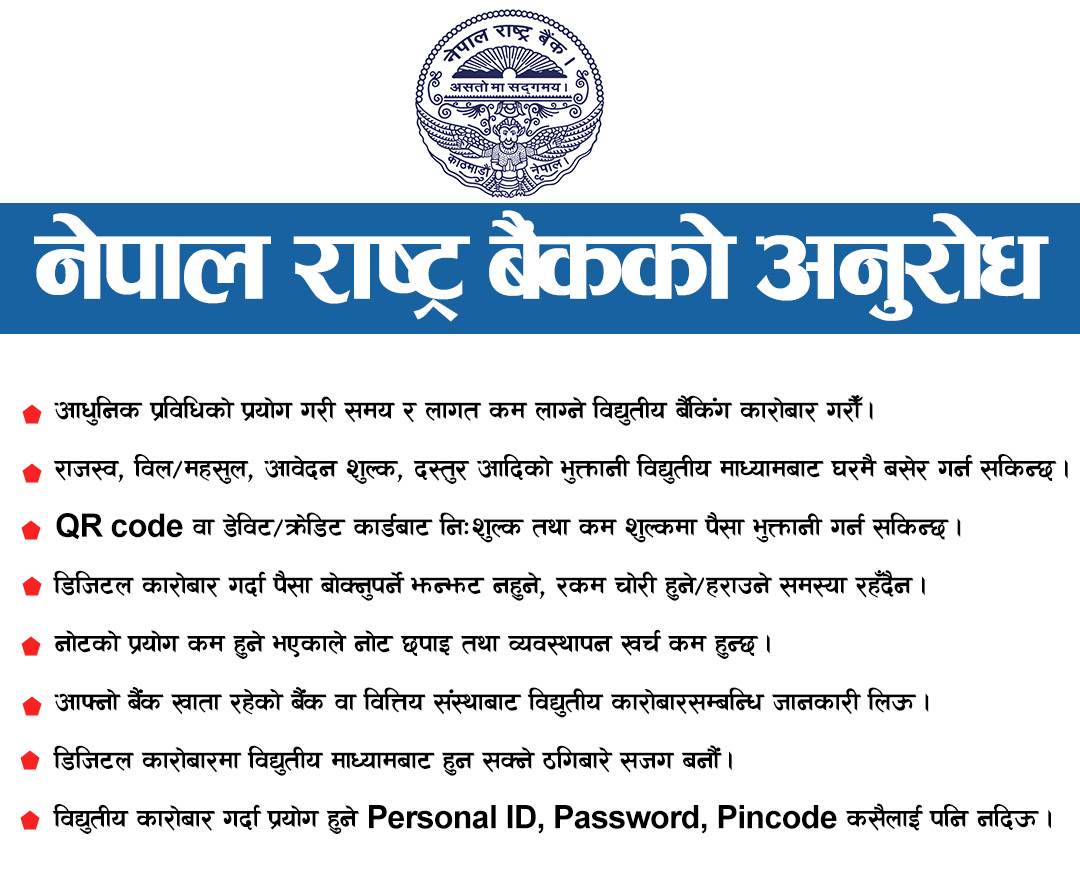'Bafia Bill' registered in the Parliament for bringing digital currency circulation
Mar Fri 2024 04:26:13
974 views

BAFIA : Bank and Financial Institutions Act 2073
Kathmandu - A bill to amend the Bank and Financial Institutions Act (Bafia), 2073 has been registered in the Parliament. The Ministry of Finance has registered the bill in the House of Representatives with important provisions including giving legal recognition to the use of digital currency and digital banking, seeking clarity on the responsibilities of people on the board of directors of banks, and discouraging the tendency to take large loans from banks that are themselves shareholders.
"Digital currency" should mean digital currency issued by Nepal Rastra Bank, the bill says. Nepal Rastra Bank is currently studying digital currency.
Likewise, a new provision has been placed in the bill to give digital banks the right to conduct banking and financial transactions. "Subject to the Bafia Act, other prevailing laws, articles of association and regulations and the limits, conditions or instructions set by the National Bank, the digital bank may carry out banking and financial transactions, including taking deposits, granting loans, as specified by the National Bank," the bill states. A digital bank is included in the definition of a bank, while the amount deposited through electronic means is going to be considered as a deposit.
In banks and financial institutions, the definition of executive chairman has been removed and only the provision of chairman has been kept. Similarly, it is proposed to change the definition of substantial ownership. "Said ownership shall mean a situation where a person or an organization has jointly acquired one percent or more of the paid-up capital of a bank or financial institution, or has an influence on the management of the bank or financial institution due to share ownership," the bill states. The existing Bafia Act considers such provision to be two percent.
As it is necessary to make provision that one cannot be a director of more than one financial institution, a provision is being made that a person who is a director in a bank or financial institution cannot become a director in the Infrastructure Development Bank. In order to ensure the representation of women in the board of directors, the bill stipulates that at least one woman should be appointed as the director of a bank or financial institution with female shareholders.
Similarly, if there is a provision in the existing law that at least one independent operator can be appointed in a bank-financial institution, then it has been amended to appoint two independent directors, including at least one woman.
The existing arrangement regarding the tenure of directors of banks and financial institutions is also going to be amended through the bill. According to the existing law, there is a provision that the directors will be for a maximum of four years and can be reappointed and nominated. By amending it, a director can be re-appointed as a director for another term only after the end of his term of office. After the proposed bill is passed by the parliament and comes into force, persons who have not reached the age of 25 years and who have exceeded the age of 70 years will not be allowed to be directors of banks and financial institutions. The existing Bafia Act has set a minimum age of 25 years to be a director, but it has not set a maximum age.
According to the bill, if a person wants to be a director, the total business loan taken by him and his family affiliated company or organization in such a bank or financial institution cannot exceed one percent of the total paid-up capital. There is no such provision in the existing Bafia Act. It is necessary to determine the limit of the business loan taken by the related person or his family.
A person who owns one percent of shares in any bank or financial institution is not allowed to work as a legal, revenue, accounting or financial management consultant, mortgage appraiser or auditor of the affiliated bank or financial institution. After the bill becomes law, all bank financial institutions will have to prepare a list of people who own more than one percent of shares and submit it to Nepal Rastra Bank. Such a list should be submitted to the National Bank within 35 days of the end of every financial year.
The bill that overall inspection and supervision of companies established with the investment of banks and financial institutions will be carried out by Nepal Rastra Bank in coordination with related agencies. Any individual, firm, organization or company can invest only 15 percent of the total paid-up capital of any bank and financial institution. Similarly, a separate institution can be appointed to collect the proceeds from the sale and distribution of the confiscated securities.







